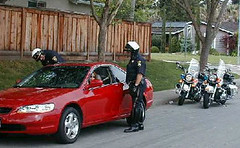Home / Constitution
I have written on Prof. Jack Balkin's wonderful discussions of Professor Bruce Ackerman's theory of Constitutional Moments and Balkin's onw theory of Constitutional amendment by partisan entrenchment before, but Balkin has added two posts to the materials and they are even better. To reset, Balkin writes:
I will try to show that partisan entrenchment offers a simpler and more compelling explanation. Of course, Ackerman’s system is trying to do much more than Levinson’s and my theory. We are merely trying to show how doctrinal change occurs. He is trying to offer a theory that both describes and legitimates constitutional change as a act of popular sovereignty. In choosing between the two accounts, it is important first to decide what you want your theory of constitutional change to do. Levinson and I offer a much simpler theory-- with fewer moving parts– that assumes that not all great transformations are necessarily faithful to the Constitution, legitimate, wise or just. At best, partisan entrenchment produces results that are roughly but imperfectly democratic, because they tend to keep the courts in sync with the dominant national political coalition of the time. Ackerman’s theory has many more complications and assumptions, but he wants to legitimate constitutional transformations, not simply explain why they occur.
Balkin then discusses Ackerman's response to the criticism that the Civil Rights movement and the changes wrought do not fit into his theory:
(5 comments, 1064 words in story) There's More :: Permalink :: Comments
Professor Jack Balkin has a fascinating post discussing Bruce Ackerman's theory of Constitutional moments, hos own theory of Constitutional change by partisan entrenchment and the possible Constitutional referendum of 2008. Balkin writes:
Both we [Balkin and his co-theorist Sanford Levinson] and Ackerman agree that if the public keeps returning a party to the White House, eventually this will result in changes in constitutional doctrine. For Ackerman, however, something more is needed-- a self-conscious mobilization on the part of the electorate demanding a constitutional transformation. Our explanation of the New Deal transformation is that the public kept reelecting Franklin Roosevelt to the White House and Democrats to the Senate, so that Roosevelt was able to replace eight Justices by the time the Court decided United States v. Darby and Wickard v. Filburn. If you keep returning the same party to the White House over and over again, eventually you are going to get significant changes in constitutional doctrine. Ackerman agrees, but argues that what was crucial was that the American public in the 1936 election self consciously sought and approved of constitutional transformation.
More...
(10 comments, 1256 words in story) There's More :: Permalink :: Comments

Via How Appealing (which has the order posted here), the D.C. Court of Appeals has refused to review en banc the decision a panel of judges issued in March finding that the Second Amendment conveys an individual right to bear arms.
The appeals court decision had struck down the District of Columbia's ban on handguns. That opinion is here (pdf).
I agree this means it's more likely the U.S. Supreme Court will take up the issue.
More at Scotusblog; Volokh; Cato Institute.
(5 comments) Permalink :: Comments
In his veto message to Congress, President Bush claims the Iraq Supplemental is unconstitutional:
[T]his legislation is unconstitutional because it purports to direct the conduct of the operations of the war in a way that infringes upon the powers vested in the Presidency by the Constitution, including as Commander in Chief of the Armed Forces.
Nonsense. Here is the Iraq language in the bill. Nothing contained therein "purports to direct the conduct of the operations of the war." It purports to condition the deployment of troops in the conduct of the war by requiring the President certify that certain conditions are being met.
Article 1, Section 8 of the Constitution provides among Congress' powers, the power:
To raise and support Armies, but no Appropriation of Money to that Use shall be for a longer Term than two Years
This appropriation is a direct and express exercise of that power. It clearly is constitutional.
(38 comments) Permalink :: Comments

The Supreme Court today heard oral argument in a case that will decide whether a passenger, as well as the driver, has been seized for 4th Amendment purposes during a traffic stop.
The question of whether a “reasonable” passenger would feel free to leave was significant because that perception is a principal part of the court’s test for whether a “seizure” has taken place within the meaning of the Fourth Amendment, which prohibits unreasonable searches and seizures.
If a reasonable person would not feel constrained, then he or she has not been “seized” and has no basis for complaining that the police have violated the Fourth Amendment. The converse is also true: a person who reasonably feels detained by the police is entitled to challenge the validity of the police action and perhaps to keep illegally seized evidence out of court.
Thanks to Justice Souter for pointing this out:
More...
(14 comments, 289 words in story) There's More :: Permalink :: Comments
Tony Snow says Congress has no oversight authority. That certainly explain the last six years of the Republican Congress. Anyway, James Madison sent this note:
The Federalist No. 51The Structure of the Government Must Furnish the Proper Checks and Balances Between the Different Departments
Independent Journal
Wednesday, February 6, 1788
[James Madison]
To the People of the State of New York:
(3 comments, 2002 words in story) There's More :: Permalink :: Comments
Via Glenn Greenwald:
Evidently, [the President] wants to shield virtually any communications that take place within the White House compound on the theory that all such talk contributes in some way, shape or form to the continuing success and harmony of an administration. Taken to its logical extreme, that position would make it impossible for citizens to hold a chief executive accountable for anything. He would have a constitutional right to cover up. . . . Most of us want no part of a president who is cynical enough to use the majesty of his office to evade the one thing he is sworn to uphold -- the rule of law.
Hear hear Tony! . . . Oh wait . . . Signing off folks. Until tomorrow.
(3 comments) Permalink :: Comments
So here we are:
President Bush and Senate Democrats clashed angrily this afternoon, as the president said he would not allow his key aides to testify under oath about the dismissal of United States attorneys, while the Democrats insisted they would settle for no less.
So Congress issues the subpoenas. BushCo officials defy them. What next? Congress seeks to enforce them in United States District Court for the District of Columbia. But if this to be fought in the court, it'll end up in the Supreme Court. Kagro notes it is the Department of Justice that usually represents the Congress in cases of enforcing subpoenas. Obviously, it won't here. Independent counsel will be retained or current Congressional lawyers will. What is the state of the law on this issue? And the issue will be executive privilege. I wrote a post on this a few days ago. Short version - it won't be decided by law. It will be the politics of this that decides it. To wit - who ever loses the political battle with the American People will give in the most. Right now, the Dems have a great hand to play. Let's hope they don't screw it up. But if you insist on a little more law on the matter, I have some on the flip.
(36 comments, 591 words in story) There's More :: Permalink :: Comments
Senator Pat Leahy announced he will seeks public testimony from White House officials via subpoena. Not surprisingly, the White House started to use the dread "E phrase":
Dan Bartlett, counselor to Mr. Bush, has said it is “highly unlikely” that the president would waive executive privilege to allow his top aides to testify publicly. One Republican strategist close to the White House, speaking on the condition of anonymity so as not to appear to be representing the administration [ASIDE: Huh? This is the most bogus basis for granting anonynmity I have ever read.], said: “No president is going to let their senior staff assistant to the president go testify. Forget that. They might agree to do an informal interview, but they’ll never testify.”
A matter of principle? Separation of powers? Try a matter of politics:
[A] report by the nonpartisan Congressional Research Service say[s] presidential advisers, including 47 from the Clinton administration alone, have frequently testified before Congressional committees, both while serving the president and after they had left the White House.
It's the politics. And it will be the politics that decides whether they testify or not. But, since this is a law blog, let's look at the law on the other side..
(12 comments, 2175 words in story) There's More :: Permalink :: Comments
Posting about Con Law Prof. Sanford Levinson's ruminations on writing a better Constitution, which entail some very serious thinking on the democratic processes enshrined in our Founding document, Ezra Klein, an always interesting and almost always smart writer, misses the point imo. Ezra writes:
I could totally write a better constitution. Know why? I have 250 more years of historical knowledge and contemporary context with which to ensure it's applicable to modern times. For instance: I could write a way clearer 2nd amendment, and I'd limit judicial terms to 12 years, and I'd make the electoral college go bye-bye.
But these "improvements" miss the point of Levinson's work and, frankly miss the point of the Constitution. I'll explain why I think so on the other side.
(26 comments, 2855 words in story) There's More :: Permalink :: Comments
Matt Yglesias writes:
Joe Klein names a few characteristics of right-wing extremists, including:*believes that homosexuals are condemned to hell. *believes that there are inferior religions.. . . I don't really think it's fair to condemn people for holding them. To me the belief that gay sex acts are immoral is false and hard-to-justify. It's not, however, politically objectionable unless the believer goes on to believe that government policy should be aimed at criminalizing gay sex acts or discriminating against gays or lesbians. After all, there are tons of religious prohibitions (Muslims don't drink alcohol, Hindus don't eat beef, Jews don't eat pigs, Pentacostalists don't dance) that I don't agree with, but that I also don't have a problem with unless the believers want to turn them into legal prohibitions.
Matt's objections seem limited to political ones. I think the bigger objection is Constitutional. The First Amendment and the Separation of Church and State, that much maligned phrase.
(8 comments, 638 words in story) There's More :: Permalink :: Comments
Anti-abortion activists had hoped to use South Dakota's tough new abortion prohibition as a test case -- testing the positions of the Supreme Court's newest members, Justice Alito and Chief Justice Roberts. The plan ran into a snag when South Dakota voters rejected the law.
Proponents of the strategy hoped that the state legislature would ignore the will of the voters and pass another ban, this one containing exceptions for rape, incest and life-threatening conditions. The Senate Affairs Commmittee today rejected the new bill by a vote of 8-1. The Committee deserves a shout out for declining to waste time and money by advancing unconstitutional legislation.
(1 comment) Permalink :: Comments
| << Previous 12 | Next 12 >> |







